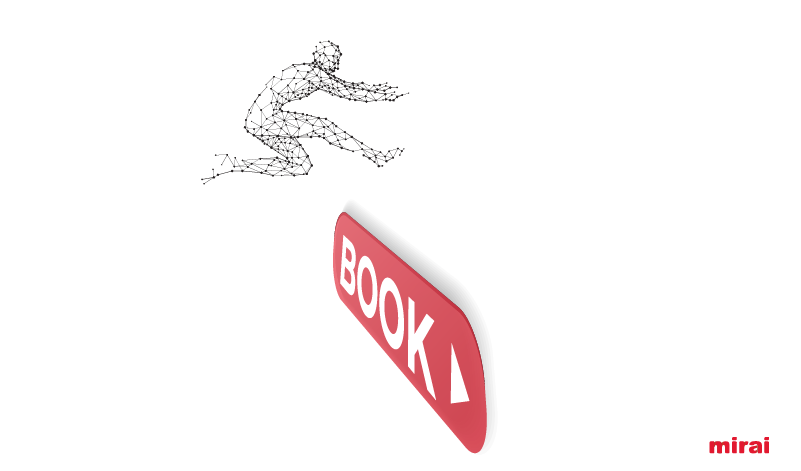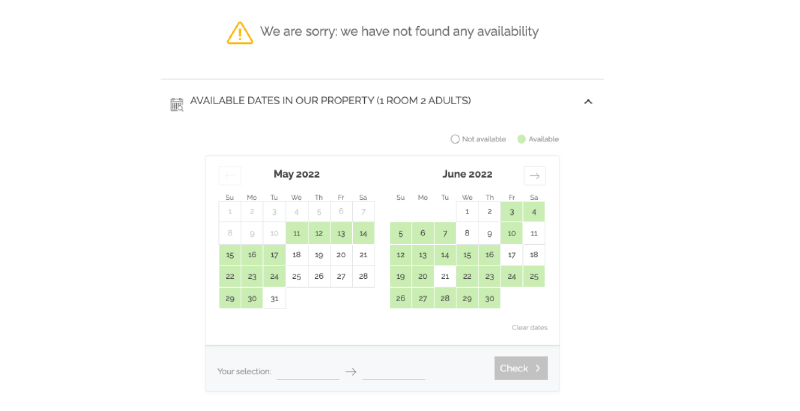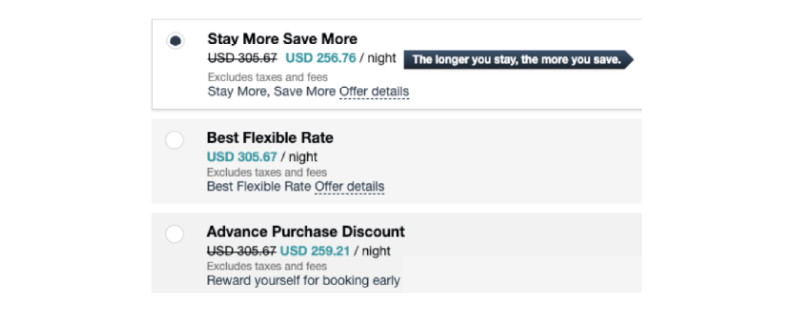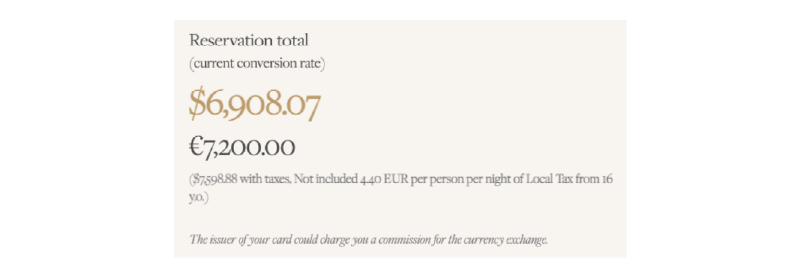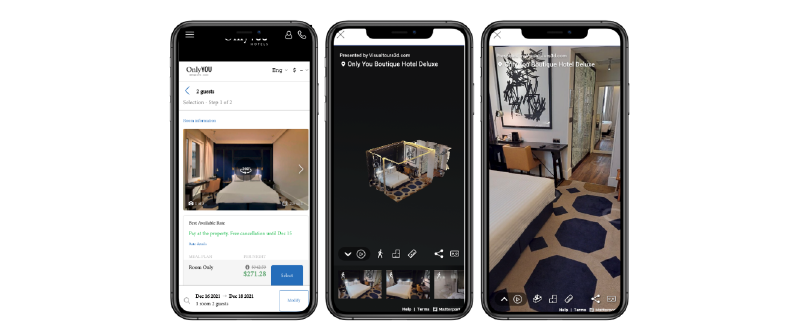En español, en français, em português.
Hoteliers are obsessed with “bringing as many users as possible to my website.” Attracting quality traffic and not just any users is an essential part of a good direct sales strategy. To this end, most hotels develop more or less ambitious online marketing plans. Investments are often substantial, but the results tend to disappoint.
Not all users who visit your site end up booking a room. Many didn’t even come to make a booking but to look for a phone number or address, check out photos or clarify doubts about the facilities. Many others, however, didn’t manage to book despite trying to do so. Have you ever wondered how many visitors of each type you have? It’s hard to know, really. And it doesn’t help that website platforms or booking engines provide almost no information about what is known as the “booking funnel” or “conversion funnel”. One might say you’re essentially in the dark when it comes to this matter. As a result, the vast majority of hotels wrongly assume that users who don’t book on their website, simply aren’t willing or ready to do so.
This complacency leads to a vicious circle that can become quite dangerous: on the one hand, you have users trying to book but not managing to do so and, on the other hand, a hotel that is investing in attracting even more users to the website only to, once again, have most of them leave without booking. This spiral silently but forcefully eats away at the efficiency of your direct sales.
How to break this spiral? By understanding the booking funnel, identifying the problems at each level and applying concrete solutions to each case. We will group them all into three hurdles that every user who wants to book a stay at your hotel must overcome. Three hurdles that, strangely enough, are the result of decisions that you as a hotelier have made, whether consciously or not. Reducing or simply eliminating these hurdles should be your number one priority, as it will increase the volume and profitability of your direct sales. So, get cracking and tap into the potential that direct sales has proven to have in the aftermath of the pandemic.
The first hurdle: your website and access to the “check availability and prices” section
The vast majority of the traffic that lands on your website comes from people searching for you by name on Google or TripAdvisor, which means they already know you. Those who have already made up their mind will be very much oriented towards “buying something”, in most cases a room, though it could also be a meeting room or a reservation at the restaurant. We therefore have a qualified lead (which we have probably attracted by paying) and we are faced with the challenge of “converting” it into a sale. So far so good, but this is where the problems begin.
- An unattractive, unusable or slow website. We will not spend much time on this point, as we have all heard it before, but it is important nevertheless. There are still many websites out there that could be substantially improved, especially their mobile phone versions. Slowness is another typical error, and the use of a CDN (Content Delivery Network) is essential to speed up loading.
- Filling the site with ads and pop-ups about offers, Covid measures or urgent messages to try to speed up the booking. Do not confuse presenting lots of neatly ordered information, as OTA’s do, with throwing up dozens of messages or uncomfortable pop-ups that users have to close in order to continue browsing. Users have low tolerance and little patience. Don’t burn them out right from the get-go.
- Difficulty in finding the booking engine. The booking option must be visible at all times, no matter the section or height (scroll up/down). Some still make the mistake of hiding booking access for aesthetic reasons or hiding it behind icons that they think everyone will understand, when this isn’t the case.
There are certain market metrics that can help you at this point. Out of every 100 visits you receive on your website, between 30% and 45% should reach the page for checking prices and availability. Check your number yourself in Google Analytics (you can see it under Conversions > Ecommerce > Shopping Behaviour, if you use Google Analytics enhanced ecommerce) or ask your web or engine company. The percentage may vary depending on the services and facilities you have, but don’t let your guard down. An unusually low number indicates a problem.
- A bad experience when it’s time to “start” booking. You’ve got the user to come this far… but your booking engine isn’t up to the task.
– The mobile phone experience must be complete, with no need to zoom in and out, and fully adapted to finger effects, avoiding the use of arrows. Anything else is a desktop engine adapted to a mobile phone. This is no longer enough.
– Calendars must show Sundays as the first day in countries where this is the norm, such as the USA or Japan. Having Monday appear as the first day for an American is clearly a mistake.
– Ask for just enough information. There are booking engines that, in order to display prices, ask in advance for the type of room or board the user is interested in. Limiting the products you present users with substantially reduces conversion.
– Allow users to book several rooms at once. And each with its own occupancy. If they can’t, you run the risk of them going to Booking.com or Expedia, which will allow them to do so. 11% of bookings are multi-room and 35% of these are for different occupancies. The grand total of multi-room bookings accounts for 18% of total revenue.
– Handle bookings with children properly. Define in clear terms what it means to be a child. Families have a very hard time when they do not know whether their children are considered children or adults, cannot specify ages, or mark whether they are coming with babies.
– Don’t make your guests work unnecessarily. Remember the last selection a user made and don’t ask them to indicate dates or occupancies a second time. Failing to do so can result in users clicking 10-25 times each time they visit your website. Make life easier for your users and they will reward you.
The second hurdle: there is “nothing” to book
Congratulations, you have succeeded in getting your customer over the first hurdle. There have been “casualties” but don’t worry, we have a plan to minimise them. Our lead is becoming increasingly relevant. Now things get even more interesting.
Do you know the worst message you can send the user at this point? Why, the worst news imaginable: “Sorry, but I don’t have anything for you to book.” Do you know how often this happens to you? You’d be surprised; it happens more than you think (in some hotels, up to 30% of the time), especially now that sales are speeding up. Once again, the lack of information about what happens in the booking funnel leaves you with no answers. The booking engines are the ones that have all the data that can help you. Otherwise, this emptiness will lead you, once again, to dangerously complacent thoughts, such as: “If there is nothing to book, that means we are full and that is good.” Reality is quite different, as we will see below. I would also like to remind you that you are paying to bring visitors to your website only to tell them you have nothing for them. You should be very strict when performing this analysis.
The key to lowering this second hurdle is to understand every possible scenario in which you send this negative message to a potential guest. There are more reasons than you think and you need to know how each one is affecting you in particular.
- Identify the number of times you had rooms available, but not the ones the user was looking for or needed because those were already full. With information in hand, you can quantify how many sales you are losing and it will help you adapt your inventory to the demand. Some options you could consider are converting double rooms into triple rooms, accepting occupancies that include up to three children, providing some rooms for one even on dates when you thought nobody would want to sleep alone, or creating a new type of room by joining connecting doubles, for instance.
- Beware of restrictions. Look into cases where you have the rooms the user wants but restrictions apply (such as a minimum stay of X nights), making the sell impossible to complete. Restrictions are a great weapon for revenue management, but it is also key that you know the exact impact of the sales you lose. Having this information will allow you to better manage restrictions or relax them when necessary (if you allow them only in your direct sales, the risk remains relatively under control), but always knowing the exact increase in demand you can expect. It’s the difference between acting blindly or with data to back up your decisions.
- Make sure you explain to the user which occupancies you do and do not allow. Do not even let them consult combinations or occupancies that you will not accept, as it is an ordeal that can be quite frustrating. Many engines still haven’t polished this detail.
- Inform the user well if it is too late to book because you still work with a release. Divert them to the phone to let them know why they cannot book online.
- If your hotel is seasonal, let them know when the opening date is. Users do not know when you open each year, and it is normal for them to check dates when you are still closed. Give them more information to stop them from going crazy and turning to the OTA’s and therefore risk them being diverted to other hotels.
- Beware of inactive promotional codes. A common mistake is to not provide a clear answer when a user enters a promotional code that has expired or that only applies to certain dates. Your duty is to inform them properly and invite them to consult the inventory available without that code. Failure to do so will lead them to become frustrated with not knowing why the code doesn’t apply.
- Manage things carefully when you are really full. In cases when you are truly full, make it clear that you have no inventory at the moment, offer alternative dates that match the customer’s enquiry, recommend other hotels that belong to your group, or invite the customer to call you on the phone. If you have answered this message very often, ask yourself whether you are selling at the right time and at the right price. Having the information of all the sales you are missing out on because you have run out of inventory, will help you to manage your inventory in a much safer way.
In all of the above cases, your booking engine is the key to all the answers that will help you spot opportunities to sell more. Go to it to collect data broken down by date of stay, source market, length of stay, advance booking, device and occupancy. It can also help you to quantify the sales you are losing at this second hurdle. Lastly, it is up to your booking engine to provide you with reliable answers and clear messages in each of the above cases. This will allow you to recover a part of these sales.
If it doesn’t provide the data you are looking for or the answers to the different scenarios you are analysing, perhaps you should look for an alternative service that does. There are many tenths of a conversion rate at stake and therefore lots of money. This is not the place to skimp. Every day you spend in the dark is a day you lose sales.
The third hurdle: you present all your options, but the user doesn’t book
Once again, congratulations. We have something the customer can book. Our lead continues to become more relevant. It is time to close the sale. We have everything we need to succeed. And yet, we lose many users at this third hurdle. Why?
- Disparities. Everything was going smoothly until an OTA (or “partner”, as they want us to call them) beats your price by lowering their margin. We are not going to spend time now on the origin of the disparities or how to eliminate them, but it goes without saying that no one in their right mind is going to book on your website if you are more expensive than an OTA, even more so if it is a well-known one like Expedia or Booking.com. Remember that direct sales start with controlling your partners.
- Inadequate price. Another classic worthy of attention. Selling at the right price is an art, and if you don’t exercise it well, you will create an insurmountable hurdle for users. If you have a pricing problem, you will notice it in all your channels, not just on the website. Keep an eye on your revenue strategy.
- Excessive and redundant rates displayed. Show only what makes sense to book and hide all the rest. Your booking engine should hide rates and offers that are meaningless or redundant. Make life easier for your customers and show them only what they need. Nothing more. Otherwise, they might hesitate and waste time trying to understand why they can book two options that look exactly the same but have different prices. This generates mistrust and can be fatal for your conversion.
- Lack of transparency with regard to prices in other currencies, taxes and rates. This is something that OTA’s do very well; few engines can compete. Use the customer’s currency (not the hotel’s) and break down taxes and fees at the right time. The solution is not to include all taxes from the beginning, as there are certain markets, like the US, that see prices without taxes. The worst trick is to hide them and not show them, as this generates doubt and will lead to a drop in conversion. It is a matter of matching the price information to the market where the customer is located and adding taxes and fees where appropriate and in a very clear way, as in the example below.
- Unattractive content. If you want to sell, and this applies especially your more expensive rooms, you must give good reasons for doing so. Include 3D photos and videos. Look for the wow effect that will make your website stand out. Polish your descriptions, services and translations. Don’t leave anything up to chance. Losing or converting a user is at stake.
- Lack of distinctive incentives for booking through your website. For the vast majority of users, booking with an OTA is much easier and safer than booking through your website. Therefore, you must offer something truly unique to your customers if you want to persuade them to book through your site. It can (and should) include a better price but also intangibles assets that make booking with you really worthwhile. For example, a better cancellation or payment policy, extra services, access to an area such as a spa, or a discount at the restaurant. If there is no extra value to be found, the user will be tempted to close the site and book on Booking.com.
- Confusing the user who has come from metasearch engines. This is one of the many pitfalls of trying to internationalise the sales of your direct channel. If a user sees “$256 without tax” on google.com, when they reach your booking engine you should display “$256 without tax”. If you do not maintain this consistency and start showing prices in a different currency or including taxes out of the blue, many users will close your site and seek out one that speaks their language.
- Do not combine prices and offers in a single bookable element. Have you heard about the OTA’s so-called Smart Deal? It simply consists in choosing the best price from each offer and creating a rate that is a combination of different offers, but one that takes into account all the conditions you have indicated, and provides a price that is more competitive than any of the offers it is made up of. You should do the same and make sure your engine is capable of creating value deals. In our booking engine 1% of incoming bookings are for this type of rates.
- Redirect the user to another window (pop-up) and change domain. The shopping experience should be as natural as possible; changing windows (pop-ups) and, what’s worse, domains, can be very frustrating, especially for mobile and unsophisticated users. The booking engine is just another part of your website and, as such, should maintain the same look and feel, as well as the navigation menu.
- Lack of alternative forms of payment to credit cards. A growing number of customers are familiar with Bizum, PayPal, Klarna or Apple Wallet and OTA’s now offer them all. Incorporate all these options into your website and compete on equal terms.
- Asking the customer for more information than you need in order to book. Many hotels include fields in the booking form that have nothing to do with the booking, check-in or billing process. Data such as ID card or passport number are irrelevant for the booking and generate a high amount friction in the process, negatively impacting conversion. It’s simple: the more fields users have to fill in, the lower your conversion will be.
Conclusion
As we have seen, your customers have to overcome many hurdles if they want to book a room on your website. You lose sales and you don’t know where or why. The problem has often been waved away as the result of users not wanting to book because they don’t want to or because you are full. This is far from the truth. This lack of knowledge has led many hotels to make the wrong decisions in their distribution strategy and in their choice of booking engine which, as we have seen, is key in all of this, despite it seeming that just about any will do. Add to this hoteliers’ keenness to bring more and more visits to their website (only to not convert them at the right rate) and we end up with a situation in which many hotels today are stuck in an absurd spiral of high investments and low conversion.
At Mirai we focus heavily on data, and we carefully analyse the reasons why not everyone who asks you for availability ends up booking on your website. We make everything available to our clients so that they can use this information to adapt their strategies and increase their conversion rates. There are commercial customer experience tools that can also help you to improve and optimise your direct channel.
Your obligation as a hotel is to know what is happening in your booking funnel, to have quality data and to have a good understanding of the different scenarios. This data-driven insight will allow you to properly address and remove each of the existing hurdles, which will automatically increase your conversion and monetisation. And the best part: you’ll do it without spending any extra money on marketing. The results of your campaigns will finally live up to your expectations.



